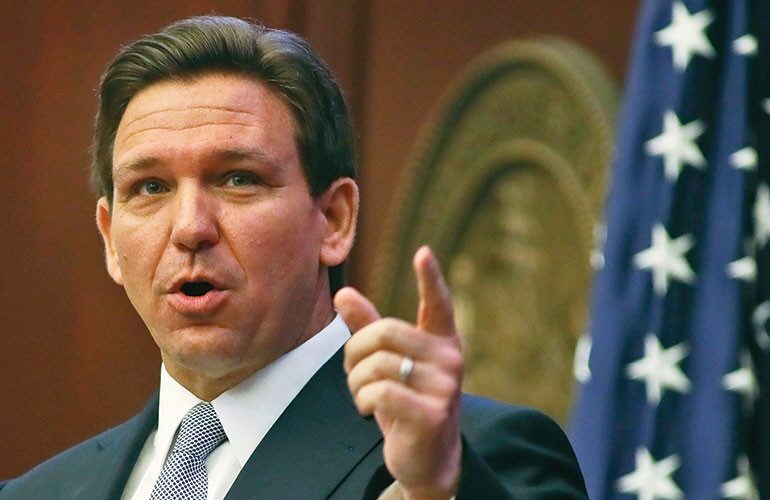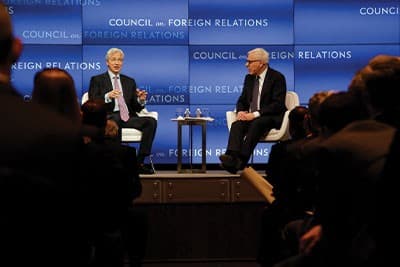
States Fight Back Against ESG Wokeness
A new Florida law that stands in the breach against the Wall Street-ESG juggernaut serves as model legislation for other states, while 25 states sue the Biden administration over ESG. …
by William F. Jasper
On February 13, Florida Governor Ron DeSantis was joined at a press conference by Florida Senate President Kathleen Passidomo and Florida House Speaker Paul Renner to announce comprehensive legislation “to protect Floridians from the woke environmental, social, and corporate governance (ESG) movement that continues to proliferate throughout the financial sector.” At the time of this writing, that legislation, House Bill 3 (HB3), has passed both houses of the Florida Legislature and is expected to be signed by Governor DeSantis. It will then serve as model legislation for 20 or more additional states that have lined up against the Wall Street-ESG juggernaut.
“Today’s announcement builds on my commitment to protect consumers’ investments and their ability to access financial services in the Free State of Florida,” declared Governor DeSantis. “By applying arbitrary ESG financial metrics that serve no one except the companies that created them, elites are circumventing the ballot box to implement a radical ideological agenda. Through this legislation, we will protect the investments of Floridians and the ability of Floridians to participate in the economy.”
“The goal of corporate activism seen in environmental, social, and governance investing (ESG) is to bypass democracy and transform capitalism to serve an ideological agenda,” said House Speaker Paul Renner. “We will not allow these martini millionaires to push unsafe and unsound investment practices that silence debate in the political process, weaken investment strategies for Florida retirees, and discriminate against any individual’s beliefs. I am proud to stand with Governor DeSantis and Senate President Passidomo to put taxpayers, investors, and Florida retirees first.”
Here are the provisions that Florida’s HB3 aims to implement:
• Prohibiting big banks, trusts, and other financial institutions from discriminating against customers for their religious, political, or social beliefs — including their support for securing the border, owning a firearm, and increasing our energy independence.
• Prohibiting the financial sector from considering so called “Social Credit Scores” in banking and lending practices that aim to prevent Floridians from obtaining loans, lines of credit, and bank accounts.
• Prohibiting banks that engage in corporate activism from holding government funds as a Qualified Public Depository (QPD).
• Prohibiting the use of ESG in all investment decisions at the state and local level, ensuring that fund managers only consider financial factors that maximize the highest rate of return.
• Prohibiting all state and local entities, including direct support organizations, from considering, giving preference to, or requesting information about ESG as part of the procurement and contracting process.
• Prohibiting the use of ESG factors by state and local governments when issuing bonds, including a contract prohibition on rating agencies whose ESG ratings negatively impact the issuer’s bond ratings.
• Directing the Attorney General and Commissioner of Financial Regulation to enforce these provisions to the fullest extent of the law.
Governor DeSantis, who last year pulled $2 billion from BlackRock over ESG investing, is now leading an alliance of 20 state governors in the battle against ESG. “We as freedom loving states can work together and leverage our state pension funds to force change in how major asset managers invest the money of hardworking Americans, ensuring corporations are focused on maximizing shareholder value, rather than the proliferation of woke ideology,” the governors said in a joint statement issued on March 16.

States vs. “woke mob”: South Dakota Governor Kristi Noem is one of 20 governors who have signed on to a declaration calling ESG “a direct threat to the American economy, individual economic freedom, and our way of life.” (AP Images)
“The proliferation of ESG throughout America,” the statement continues, “is a direct threat to the American economy, individual economic freedom, and our way of life, putting investment decisions in the hands of the woke mob to bypass the ballot box and inject political ideology into investment decisions, corporate governance, and the everyday economy.” The governors say they “agree to lead state-level efforts,” including:
I. Protecting taxpayers from ESG influences across state systems: Among other actions, this may include blocking the use of ESG in all investment decisions at the state and local level, ensuring that only financial factors are considered to maximize the return on investment, protecting retirees and taxpayers alike. This may also include eliminating consideration of ESG factors by state and local governments when issuing bonds or prohibiting state fund managers from considering ESG factors when investing taxpayer money.
II. Protecting citizens from ESG influences in the financial sector: Among other actions, this may include banning the financial sector from considering so called “Social Credit Scores” in banking and lending practices aimed to prevent citizens from obtaining financial services like loans, lines of credit, and bank accounts. This may also include stopping financial institutions from discriminating against customers for their religious, political, or social beliefs, such as owning a firearm, securing the border, or increasing our energy independence.
The governors who have thus far signed on to the anti-ESG declaration are Kay Ivey (Ala.), Mike Dunleavy (Alaska), Sarah Huckabee Sanders (Ark.), Ron DeSantis (Fla.), Brian Kemp (Ga.), Brad Little (Idaho), Kim Reynolds (Iowa), Tate Reeves (Miss.), Mike Parson (Mo.), Greg Gianforte (Mont.), Jim Pillen (Neb.), Chris Sununu (N.H.), Doug Burgum (N.D.), Kevin Stitt (Okla.), Kristi Noem (S.D.), Bill Lee (Tenn.), Spencer Cox (Utah), Glenn Youngkin (Va.), Jim Justice (W.Va.), and Mark Gordon (Wyo.).
25 States Suing Biden Over ESG
In addition to the actions by state governors and state pension-fund managers, the attorneys general of 25 states are suing the Biden administration to stop his ESG agenda, which they say not only jeopardizes the pensions of millions of workers but also is in violation of federal law.
The state AGs argue in their suit that the 2022 Investment Duties Rule implemented by the Biden Labor Department “undermines key protections for retirement savings of 152 million workers — approximately two-thirds of the U.S. adult population and totaling $12 trillion in assets — in the name of promoting environmental, social, and governance (‘ESG’) factors in investing, including the Biden Administration’s stated desire to address climate change.”
The 25 states participating in the lawsuit are Alabama, Alaska, Arkansas, Florida, Georgia, Idaho, Indiana, Iowa, Kansas, Kentucky, Louisiana, Mississippi, Missouri, Montana, Nebraska, New Hampshire, North Dakota, Ohio, South Carolina, Tennessee, Texas, Utah, Virginia, West Virginia, and Wyoming.
“Trust Us. We Know What’s Best for You and the Planet”
David Rubenstein is the billionaire co-founder and co-chairman of the Carlyle Group, a private equity mega fund, as well as the host of The David Rubenstein Show and Bloomberg Wealth with David Rubenstein, both on Bloomberg Television. He is also a regular financial oracle at the World Economic Forum, chairman of the Economic Club of Washington, D.C., and, perhaps most importantly, chairman of the Council on Foreign Relations (CFR), the premier globalist organization that has been pushing for world government for the past century. He is a big promoter of ESG. In an interview with Applico CEO Alex Moazed, Rubenstein said, “ESG is basically an effort to try to say we should invest in companies that have good environmental practices, good social practices and good governance practices. Social means, let’s say, diversity. Governance means really good corporate structure and a fair one for investors…. My own view is that ESG is very important…. More and more younger people are going to want to work in companies with good ESG metrics, gonna want to buy from companies with good ESG metrics.” Asked about how ESG squares with investing in China, he answered, “I think if you’re going to invest in China you’re going to have to get comfortable with lower ESG standards.” Rubenstein and the Carlyle Group are obviously comfortable with China’s lower ESG standards — including torture, slave labor, persecution, and environmental destruction — since they have invested billions there.
Devil’s lair: David Rubenstein (right), chairman of the Council on Foreign Relations (CFR) and co-chairman of the Carlyle Group, interviews CFR member Jamie Dimon, CEO of JPMorgan Chase, at a CFR affair. (AP Images)

Billionaire banker Jamie Dimon, CEO of JPMorgan Chase, America’s biggest bank, boasted in his introductory letter to JPMorgan Chase’s 2021 Environmental, Social & Governance Report: “We are leveraging capital and expertise across our company to support a greener future for the planet and advance racial equity.” He is an annual fixture at the WEF’s glittering Davos affairs and is also a prominent member of the CFR. Although he postures as an ESG champion, he has made JPMorgan Chase (JPMC) one of the major investors in Communist China, the planet’s champion ESG scofflaw. Under his management, the bank has been indicted for, and has pled guilty to, multiple felonies involving massive mortgage fraud, defrauding veterans and customers, bid rigging, bond-market rigging, precious-metals rigging, foreign currency exchange manipulation, and more. Dimon and JPMC are now being sued for knowingly aiding sex pervert Jeffrey Epstein’s child-sex trafficking for more than a decade.
Lloyd Blankfein, senior chairman of Goldman Sachs, has retired from active management of the mammoth investment and financial services firm, but for nearly two decades served as president, then CEO and chairman. Like David Rubenstein, Jamie Dimon, and BlackRock’s Larry Fink, Blankfein is a high-flying billionaire and a habitué of the WEF and CFR. Under his leadership, Goldman Sachs became a leading lender to Communist China. The company touts ESG investment but has been called out by investors for “wokewashing” its investment recommendations and fined by the Securities and Exchange Commission for deceptive ESG marketing.